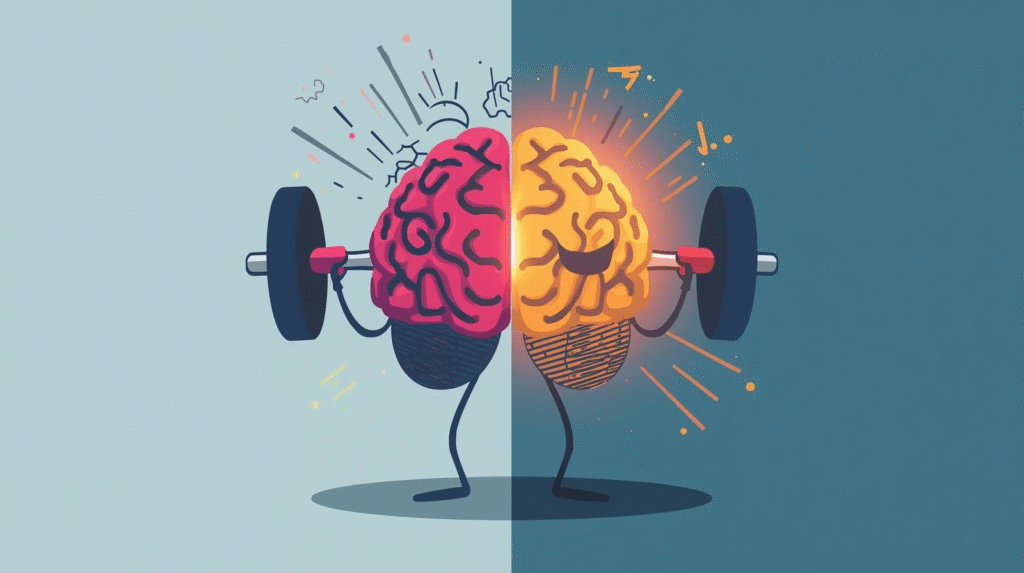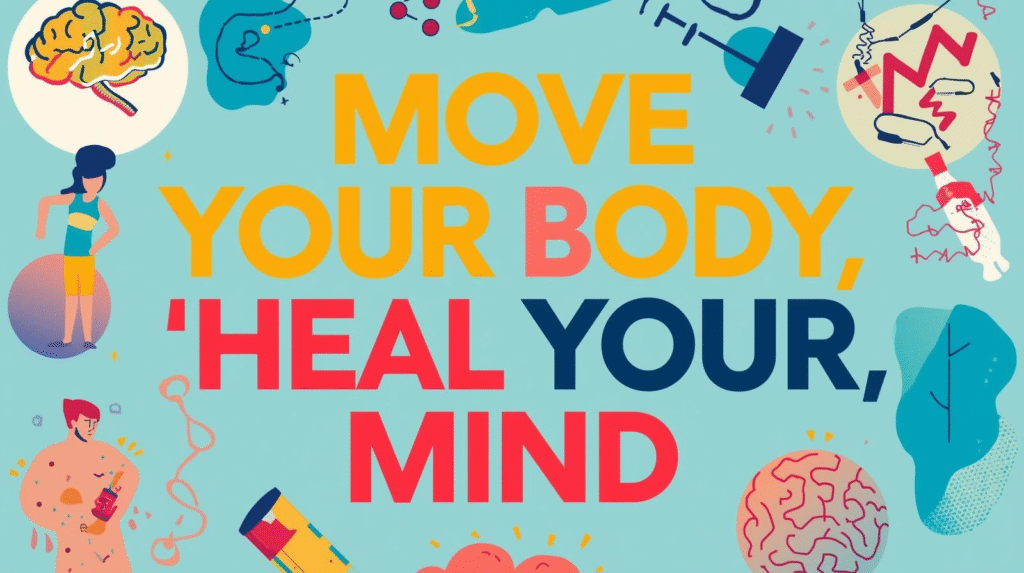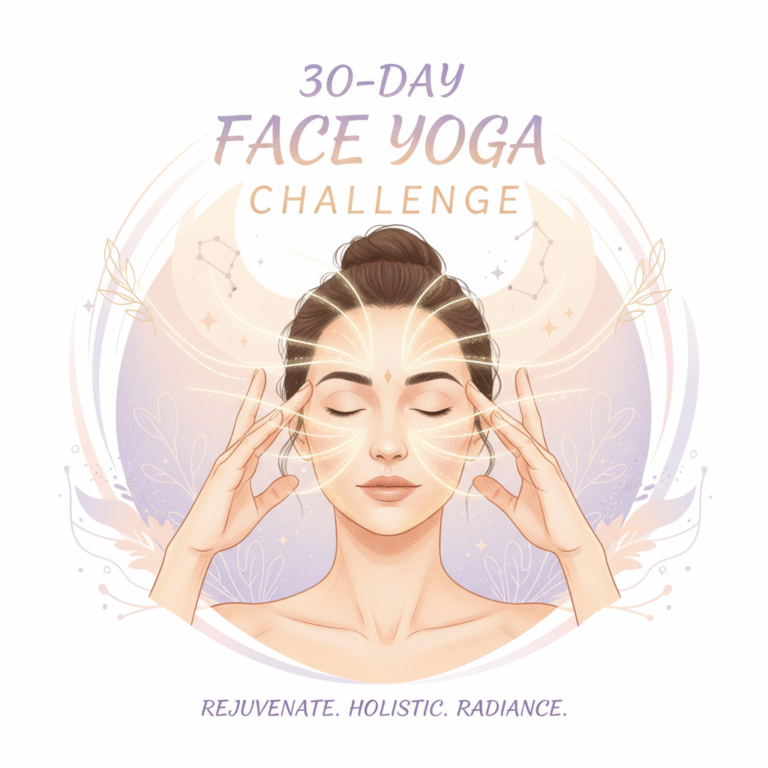
In today’s busy world, more and more people are struggling with stress, anxiety, and emotional imbalance. The pressures of work, studies, and social expectations often leave us drained—both physically and mentally. While therapy, counseling, and medication are important for many, one powerful tool is often underestimated: exercise.
Exercise is not only about building muscles or losing weight—it is about creating balance between the mind and the body. From improving mood and boosting confidence to reducing anxiety and depression, fitness plays a central role in strengthening mental health.
🧠 The Science of Exercise and Emotional Well-being
When you move your body, your brain releases chemicals called endorphins—commonly known as “happy hormones.” These chemicals act as natural stress-relievers, lifting your mood and reducing tension. At the same time, exercise lowers the level of cortisol, the stress hormone responsible for anxiety and restlessness.
But the benefits don’t stop there. Exercise also stimulates the production of serotonin and dopamine, two neurotransmitters that control happiness, motivation, and focus. People who exercise regularly often notice that they feel calmer, more positive, and better equipped to handle daily challenges.
In fact, researchers at Harvard Medical School found that regular exercise can be as effective as medication for mild to moderate depression. This makes exercise one of the most natural and accessible tools to support mental health.
🏃 Exercise as a Natural Antidepressant
One of the strongest connections between fitness and mental health is its effect on depression. While depression is a complex condition that often requires professional help, studies show that physical activity can significantly reduce its symptoms.
- A simple 20-minute brisk walk can lift your mood almost instantly.
- Regular aerobic exercise like running, swimming, or cycling promotes long-term improvement in emotional well-being.
- Group exercises such as dance classes or sports not only improve mood but also bring in the element of social connection, which further reduces feelings of loneliness.
Unlike medications, exercise has no side effects, and its benefits extend beyond mental health to improve physical strength, immunity, and energy levels.

🌱 Emotional Balance Through Fitness
Apart from depression and anxiety, exercise is a powerful tool for emotional regulation. People who work out regularly report:
- Lower mood swings
- Increased patience and emotional stability
- Better ability to handle stress at work or in relationships
This is because physical activity helps regulate the brain’s response to stress. By training your body, you are also training your mind to recover from pressure faster.
🧘 The Role of Sleep in Mental Health
One of the hidden benefits of exercise is better sleep quality. Poor sleep often leads to irritability, poor concentration, and higher stress levels. Exercise helps regulate the sleep cycle, making it easier to fall asleep and stay rested.
When you sleep better, your brain has more time to repair itself, which leads to:
- Improved focus and clarity
- Better mood control
- Stronger emotional resilience
Even light evening walks or stretching routines can improve sleep patterns over time.
🌍 Global Perspectives on Fitness and Mental Health
The link between fitness and mental health is universal, but the way people practice it varies across cultures.
| Country | Common Fitness Practices | Impact on Mental Health |
|---|---|---|
| India | Yoga, meditation, jogging | Promotes calmness, reduces stress |
| Canada | Hiking, gym workouts, cycling | Builds resilience, fights seasonal depression |
| Australia | Surfing, outdoor sports, running | Enhances social connection, reduces anxiety |
No matter where you live, the formula remains the same: move your body, strengthen your mind.

💪 Confidence and Self-Esteem Boost
Physical fitness doesn’t just change how your body looks—it changes how you feel about yourself. A consistent workout routine often results in:
- Better posture
- Higher self-confidence
- Improved self-image
When you feel good about your body, your mind automatically follows. This self-confidence is not just about appearance—it also comes from knowing you are disciplined, capable, and strong.
📉 Stress and Workplace Burnout
Modern workplaces are one of the biggest contributors to mental stress. Long hours, deadlines, and pressure to perform often result in burnout. Exercise acts as a release valve for this pressure.
Even a short 15-minute break to stretch, walk, or do breathing exercises can lower stress instantly. Companies around the world are now encouraging workplace fitness programs, knowing that healthier employees are also happier and more productive.

🌟 Conclusion
Mental health is as important as physical health, and the two are deeply connected. Exercise is one of the most powerful natural ways to improve emotional well-being. It reduces stress, improves sleep, boosts confidence, and protects against anxiety and depression.
Whether it’s a yoga session in India, a cycling trip in Canada, or a morning run in Australia, fitness creates a pathway to a healthier mind. The best part? It’s free, accessible, and available to everyone.
So the next time you feel stressed or overwhelmed, remember—your best therapy might just be your next workout.
Which type of exercise is best for emotional well-being?
Yoga, meditation, aerobic exercises (running, swimming, cycling), and strength training are highly effective for reducing stress and improving emotional balance.
Can exercise really reduce depression and anxiety?
Yes. Research shows that regular physical activity works like a natural antidepressant, boosting endorphins and reducing stress hormones like cortisol. It helps manage both anxiety and depression symptoms.
How fast does exercise improve mood?
Many people notice improvements immediately after a single session of exercise, thanks to endorphins. Long-term benefits such as reduced anxiety and better emotional stability appear after 4–6 weeks of consistent activity.
Can exercise replace therapy or medication for mental health?
No. Exercise is a powerful support tool but not a replacement. For serious conditions like major depression or severe anxiety, therapy and medical guidance are essential. Exercise works best when combined with professional support.
Does exercise improve sleep and mental health together?
Absolutely. Exercise helps regulate your sleep cycle, leading to deeper rest. Good sleep, in turn, reduces stress, improves focus, and strengthens mental resilience.
Is group exercise better for mental health than solo workouts?
Both have benefits. Group activities provide social connection and support, while solo workouts offer self-reflection and personal growth. The best approach is whichever you enjoy and can do consistently.


